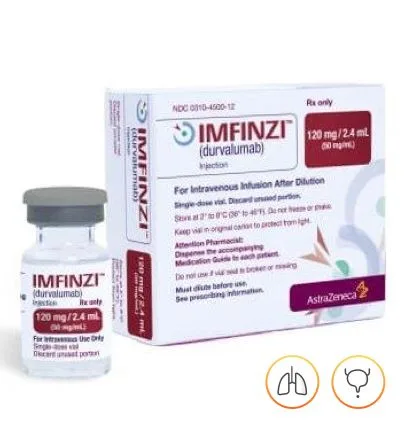London – Updated exploratory results from the TOPAZ-1 Phase III trial showed AstraZeneca’s Imfinzi (durvalumab) in combination with standard-of-care chemotherapy demonstrated a clinically meaningful long-term overall survival (OS) benefit at three years for patients with advanced biliary tract cancer (BTC).
These results from TOPAZ-1, which are the longest survival follow-up ever reported for a global, randomised Phase III trial in this setting, will be presented on 18 April at the 2024 Cholangiocarcinoma Foundation Conference in Salt Lake City, Utah.
At more than three years (median follow-up of 41.3 months), results showed Imfinzi plus chemotherapy reduced the risk of death by 26% versus chemotherapy alone (based on a hazard ratio [HR] of 0.74; 95% confidence interval [CI], 0.63-0.87). The median OS was 12.9 months for Imfinzi plus chemotherapy versus 11.3 months for chemotherapy alone. More than twice as many patients on the Imfinzi-based regimen were alive at three years versus chemotherapy alone (14.6% versus 6.9%).
The TOPAZ-1 trial met the primary endpoint of OS in October 2021 at a planned interim analysis, showing that the combination reduced the risk of death by 20% versus chemotherapy alone (based on a HR of 0.80; 95% CI, 0.66-0.97; 2-sided p=0.021 at a statistical significance threshold of 0.03).
Do-Youn Oh, MD, PhD, Professor, Division of Medical Oncology, Department of Internal Medicine at Seoul National University Hospital and Seoul National University College of Medicine, and principal investigator in the trial, said: “The latest data from TOPAZ-1 show that twice as many patients with advanced biliary tract cancer were still alive at three years with durvalumab and chemotherapy, an especially meaningful advance in a setting where historically the prognosis has been poor. These results reinforce the long-term benefit of this immunotherapy-based combination as a standard of care for patients with this devastating disease.”
Susan Galbraith, Executive Vice President, Oncology R&D, AstraZeneca, said: “TOPAZ-1 raised the bar for the treatment of advanced biliary tract cancer, showing a remarkable survival benefit for Imfinzi added to chemotherapy with a well-tolerated regimen. These data represent the longest survival follow-up reported for immunotherapy in this setting, and the three-year landmark survival improvement underscores our commitment to improving long-term outcomes in gastrointestinal cancers.”
Stacie Lindsey, CEO, Cholangiocarcinoma Foundation said: “AstraZeneca’s longer survival data in advanced biliary tract cancer represents a meaningful milestone in that we are seeing three-year survival data for the first time for these patients. The data spurs hope that research will continue to improve outcomes for patients living with these challenging and rare cancers.”
Summary of updated survival results: TOPAZ-1i
| OSi,ii
| Imfinzi + chemotherapy (n=341) | Chemotherapy (n=344) |
|---|---|---|
| Median OS (95% CI in months) | 12.9 (11.6-14.1) | 11.3 (10.1-12.5) |
| HR (95% CI) iii | 0.74 (0.63-0.87) | |
| OS rate at 36 months (95% CI) (%)iv | 14.6 (11.0-18.6) | 6.9 (4.5-10.0) |
| i. 26 months of additional follow-up (data cut-off: 23 October 2023) after the primary analysis, with 89% overall OS event maturity ii. At data cut-off for this analysis, median (95% CI) follow-up time in all patients calculated using reverse Kaplan-Meier technique was 42.9 (39.8-44.3) months for Imfinzi plus chemotherapy and 41.8 (36.7-46.2) months for chemotherapy iii. HR and 95% CI calculated using Cox proportional hazards model iv. OS rates calculated using Kaplan-Meier technique | ||
Imfinzi plus chemotherapy continued to be well-tolerated, with no new safety signals observed with longer follow-up. Results showed 15.4% of patients experienced treatment-related serious adverse events with Imfinzi plus chemotherapy versus 17.3% with chemotherapy alone.








